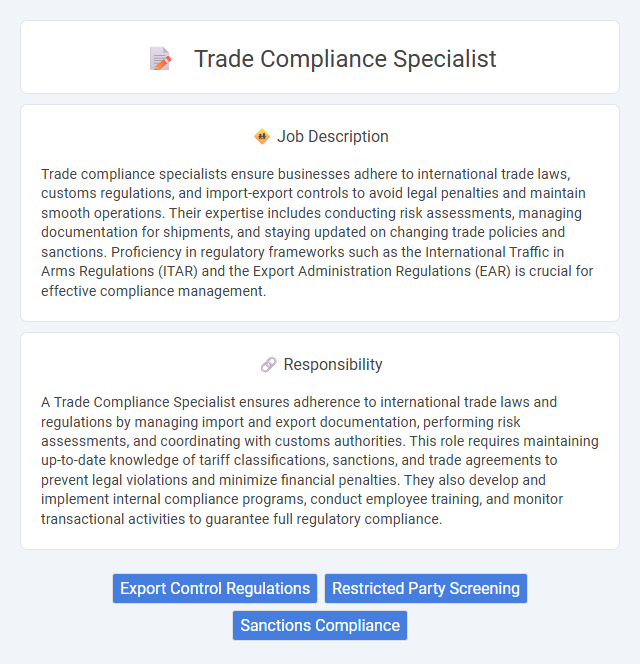
Trade compliance specialists ensure businesses adhere to international trade laws, customs regulations, and import-export controls to avoid legal penalties and maintain smooth operations. Their expertise includes conducting risk assessments, managing documentation for shipments, and staying updated on changing trade policies and sanctions. Proficiency in regulatory frameworks such as the International Traffic in Arms Regulations (ITAR) and the Export Administration Regulations (EAR) is crucial for effective compliance management.
Individuals with strong attention to detail and a solid understanding of international regulations are likely suitable for a Trade Compliance Specialist role. People who thrive in structured environments and possess problem-solving skills may adapt well to the responsibilities involving regulatory adherence and documentation. Those who prefer dynamic, fast-paced work with minimal routine could find this job less compatible with their preferences.
Qualification
Trade compliance specialists require a deep understanding of international trade laws, export controls, and customs regulations to ensure organizational adherence to global trade policies. Strong qualifications include a degree in international business, law, or related fields, along with certifications such as Certified Export Specialist (CES) or Certified Customs Specialist (CCS). Proficiency in risk assessment, regulatory documentation, and experience with global trade management software are essential for maintaining compliance and mitigating legal risks.
Responsibility
A Trade Compliance Specialist ensures adherence to international trade laws and regulations by managing import and export documentation, performing risk assessments, and coordinating with customs authorities. This role requires maintaining up-to-date knowledge of tariff classifications, sanctions, and trade agreements to prevent legal violations and minimize financial penalties. They also develop and implement internal compliance programs, conduct employee training, and monitor transactional activities to guarantee full regulatory compliance.
Benefit
Trade compliance specialists likely enhance a company's ability to navigate complex international regulations, reducing the risk of costly fines and legal issues. Their expertise probably improves supply chain efficiency by ensuring shipments meet all regulatory requirements, facilitating smoother cross-border transactions. This role may also increase a company's reputation for reliability and trustworthiness in global markets, potentially attracting more business opportunities.
Challenge
Trade compliance specialists likely face the constant challenge of navigating complex and ever-changing international regulations to ensure company adherence. They may need to interpret varied customs laws and sanctions that differ by country, increasing the complexity of maintaining compliance. Staying updated on policy shifts and effectively mitigating risks could be essential aspects of overcoming these challenges.
Career Advancement
Trade compliance specialists ensure adherence to international trade regulations, reducing risks of legal penalties and fines. Mastery of global trade laws and proficiency in customs documentation enhance eligibility for senior roles such as compliance managers or global trade directors. Continuous certification in trade compliance and cross-functional skills development accelerate career advancement within multinational corporations.
Key Terms
Export Control Regulations
Trade compliance specialists ensure companies adhere to Export Control Regulations, preventing unauthorized export of sensitive goods and technologies. Their expertise includes managing classifications under EAR, ITAR, and OFAC regulations to mitigate risks and maintain legal trade operations. They conduct audits, implement compliance programs, and train staff to navigate complex international trade laws effectively.
Restricted Party Screening
A Trade Compliance Specialist ensures adherence to international trade regulations by conducting thorough Restricted Party Screening to identify and mitigate risks associated with sanctioned or prohibited entities. This role involves utilizing advanced screening tools and databases, such as OFAC, EU sanctions lists, and UN embargoes, to prevent illegal transactions and facilitate seamless global trade operations. Expertise in interpreting complex regulatory frameworks and maintaining up-to-date knowledge of export controls is critical for minimizing compliance breaches and supporting corporate risk management strategies.
Sanctions Compliance
Trade compliance specialists focusing on sanctions compliance ensure that organizations adhere to international trade laws and government-imposed sanctions regimes, preventing illegal transactions with restricted parties or countries. They conduct thorough risk assessments, monitor transactions, and implement robust policies aligned with regulations from entities such as the Office of Foreign Assets Control (OFAC) and the European Union Sanctions Policy. Expertise in identifying red flags, managing export controls, and coordinating internal audits is essential to mitigate risks and maintain legal and ethical standards in global commerce.
 kuljobs.com
kuljobs.com